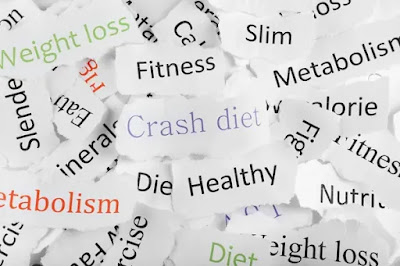A crash
diet is a quick eating strategy that promotes rapid weight loss in under two
weeks. People who wish to lose those extra pounds for special occasions like
weddings, parties and so on frequently follow the diet because it substantially
reduces caloric intake.
A crash
diet is a weight reduction plan that helps you lose extra weight quickly. It is
a strict and extremely low-calorie diet plan designed to help people reach
short-term weight loss goals. However, it is not suggested for use in long-term
weight loss plans.
Crash
diet results are transient, and if you don't maintain a healthy diet and
regular exercise routine, you'll quickly put the weight back on.
Despite the fact that it can produce the desired outcomes in just a few days, it's not suggested to perform it frequently.
When a
person is on a crash diet, they choose low-calorie foods, and when their body
is completely depleted of energy, it begins to use its fat reserves as fuel to
carry out essential functions.
Following
a crash diet frequently cause nutrient depletion, eventually weakening you.
1. Crash Diets: Do They Work?
Crash
diets don't work, to put it simply. A crash diet can help you lose weight
rapidly, but it won't help you keep the weight off in the long run. In
actuality, most people who crash diet end up gaining weight back because
they tend to go back to their former eating patterns.
Ultimately, due to the detrimental effects, it has on both your mental and physical well-being crash dieting is never advised as an effective method of weight loss.
We'll go over some of the causes why you should stay away from crash
diets and opt instead for sustainable, healthy weight loss techniques in the
paragraphs below.
2. Reasons To Stay Away From Crash Diets
What
might occur if you decide to do a crash diet? It involves more than just frequent hunger pangs or rapid weight loss. There are more ways in which it
might harm you.
Discover what might happen to you if you don't provide your body with the food it requires to function normally by continuing to read.
- Reduces The Metabolic Rate
High
metabolism is essential for weight loss, hence the major characteristic of a
crash diet is that it slows your metabolic rate. Because prolonged,
intensive dieting causes more muscle breakdown. Reduced muscle mass lowers
metabolic rate and calorie expenditure.
If your
metabolism is high, you'll burn more calories even when at rest. However, our
body will slow down the metabolism if we follow an extremely low-calorie diet
in order to conserve energy.
When
trying to reduce weight, having a slower metabolism results in burning fewer
calories while at rest.
- Losing
Water Weight / Dehydration
Have you
ever pondered why certain diets, such as juicing, result in such rapid weight
loss? It's because you're shedding water weight, which is not the best way to
lose weight over the long term.
Long-term
weight loss does not depend on the body's ability to eliminate water rather it
does rely on its ability to burn fat.
Glycogen deposits bond with water
& are used up more quickly than fat cells are able to release water.
The post-crash diet will help you replace lost water and glycogen, and it will
also cause rapid weight gain.
The main risk of such a diet is dehydration, which manifests as a terrible headache and many more problems.
- Hair
And Skin
Long-term
crash dieting causes a deficiency in crucial minerals and vitamins that the
body needs to function.
This harms the health of your skin and hair;
depriving them of nutrients causes them to look rougher, fall out more
frequently, and get pale and dry.
-
Immune
System
Crash
dieting will deprive you of vital nutrients, which might damage your immune
system. You're more prone to sickness if your immune system is compromised.
Total fat restriction can also prevent you
from obtaining the crucial fat-soluble vitamins A, D, E, and K. These vitamins
are essential for boosting the immune system. A lack of them can also cause
other illnesses.
-
Mood
Shifts
Your
mood may be affected by not getting sufficient calories throughout the day; you
may feel down, angry, and find it difficult to concentrate. To put it another
way, you might always be hungry which is unpleasant to be around!
3. Crash Diet Alternatives
Try to provide yourself ample time with regular, sensible weight loss objectives rather than subjecting yourself to the stress and dangers of a crash diet.
You will have a better chance of achieving a more fit and healthier appearance over the long term with longer-term lifestyle adjustments while avoiding the stress of restricting yourself to healthy food.
Instead of crash dieting, try these simple activities to boost your health:
- Consume less processed food and less sugary foodstuff.
- Increase your intake of lean protein.
- Eat a diet high in fruits, vegetables, nuts, legumes, and whole grains as your goal.
- Try to Reduce levels of stress, anxiety and depression.
- Trans-fat foods should be avoided, but choose healthy fats instead.
- Boost dietary soluble fibre intake
- Your metabolic rate will remain greater if you maintain a regular level of physical activity, in addition to the enormously beneficial effects exercise has on your mental health.
- Find an activity you like to do for exercise, and try to incorporate that into your everyday routine. Building muscle through weightlifting is believed to burn more calories than fat.
- Try to reach your daily goal of 10,000 steps.
- Eat healthy to be healthy.





Wow
ReplyDeleteAbsolutely amazing
ReplyDeleteInformative
ReplyDelete